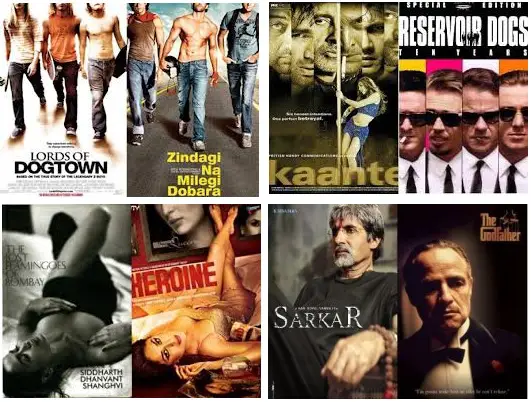
Imitation is the best form of flattery, and most producers in India think that giving a ‘desi version’ of a hit Hollywood movie (they go after other foreign movies as well nowadays) to the audience is the recipe for success; although history has shown us otherwise.
Rarely, has a desi version of a Hollywood production lived up to the success of the original. In fact, remakes of several South-Indian films have gone on to become massive hits, but rarely any Hollywood-remake!
So why does Bollywood often looks towards Hollywood for Inspiration?
Tremendous Demand for Content in India
One of the reasons is the sheer number of films that gets produced every year in Bollywood. When you talk about Bollywood, one of the topic that comes up is the number of movies that it produces every year, which then leads to the discussion that most of those movies are remakes and that Bollywood lacks originality.
With so many movies churning out so fast, filmmakers are bound to run out of ideas. That’s one of the reasons that be it music or movies, India has looked towards the World (especially Hollywood) for inspiration many a times.
By the way, what’s the difference between inspiration and copying?
I think, as far for Bollywood is concerned its more or less the same…well almost…at least that was the case until a few years back!

World is Still Not Connected
Its only in recent years that it has become so easy for information to flow across geographical boundaries. Indian filmmakers are keen to reach out to a bigger audience, and foreign production houses are coming to India to capitalize on the business opportunities. So in recent times, it has become some what difficult to straight-away lift a tune or idea from Hollywood, or for that matter any other film industry.
However that was never the case always!
Several Bollywood composers and filmmakers, in the past, have relied heavily on Hollywood for inspiration/ideas, and some of them blatantly copied as well, thinking that the audience here will not come to know about it!
Even today, its only in the metro cities of India that the audience is likely to have seen the original, and not in the smaller towns!
Remakes Make Good Business Sense
Its not that only Bollywood makes remakes; even Hollywood does lots of remakes. In fact, remakes make good business sense as its often necessary to continue producing new entertainment products for consumers.
Business-wise, it still makes sense to remake Hollywood (and other foreign) movies! Its because there’s a huge demand for movies that needs to be met.
So if production houses can make money by remaking some of the Hollywood classics, then why not?

Also, those living in the metros watch a lot of Hollywood movies; there’s still a huge audience out there (in India) who may not have seen the original movie, and really don’t care as long as the movie is entertaining (bit of everything). So the inspired versions may still get eyeballs in the smaller cities/towns!
Why Hollywood Is Interested in Bollywood
For several years Hollywood didn’t pay attention to the unauthorized remakes of Bollywood because the money involved was not significant enough. However that aspect has changed in recent years; here are some more reasons.
- India’s growing economy means there’s more money left on the table
- Slumdog Millionare’s success and the growing Indian American population has caused Hollywood to shift its attention to India’s largest film industry.
- Globally, Bollywood films have more viewers than Hollywood films
All these things mean Bollywood filmmakers just can’t steal ideas from Hollywood and make remakes, without giving due credit (and profit sharing) to the original creator.
Indian Filmmakers Viewpoint
Ask Mahesh Bhatt about Indian copying ideas, he’ll quickly disagree, because Bhatt Sahab feels that there are only a handful of original ideas in the world, and whatever movies get made, they do borrow from those ideas in some manner or the other.
Most Indian filmmakers, who’re accused of lifting ideas from foreign movies, feel that the “Indianization” of foreign films creates a distinct, non-infringing, product. These remakes often expand the original stories to include plots that focus on families and social relations. Besides, Indian films usually do not stick to one genre, unlike foreign films that can be classified as a comedy, drama, action movie, or a musical.
Indian films contain elements of all these genres (known as ‘Masala’ movies) and have about 30 to 40 minutes of song sequences (resembles American music videos). That’s why Indian filmmakers often don’t see anything wrong with their remake version.
Most Indian Filmmakers Taking the Legal Route
Filmmakers are more cautious now. It doesn’t mean they have stopped borrowing from Hollywood, it just means they give the due credit (wherever applicable) or take all the necessary permissions, buy the remake rights, and so on.
Well, at least most of the them are doing so (to avoid any legal hassles)!
But the fact remains that most movies lack originality or have very thin content, and most do look towards Hollywood for inspiration, especially if they want the movie to look stylish (costumes, styling, action scenes, car chases, etc.)!
So is it a concern for Bollywood? Not really! After all, its business at the end of the day.
Besides, its not that Bollywood is not producing original content, its just that if you look at the percentage, you might think that most of the movies produced are trash or just lacking in originality.
But then, there’s hardly anything that the world is not borrowing from America in the 21st century! Isn’t it?
Recent Controversies
- In 2007, Hollywood studios Overbrook Entertainment and Sony Pictures Entertainment came after the producers of the hit Bollywood film Partner and charged them with plagiarizing the Will Smith film Hitch (2005). Reports indicated that the studios could possibly demand $30 million from the producers of Partner. That matter was eventually settled and the details were not made public.
- A few years ago the Filipino producers of a small film Cavite got a cash settlement from the Indian production house UTV (now owned by Disney) for making Aamir (2008). Aamir closely resembles Cavite.
- In 2004, the Bhatt family made Murder—the first film in the series, lifting the plot from the Adrian Lyne film Unfaithful (2002) with Richard Gere and Diane Lane. For last year’s Murder 3, the Bhatts actually bought the rights of the Colombian thriller The Hidden Face. And their recent production Citylights was the legal remake of the 2013 British-Filipino film Metro Manila.
- Filmmaker Karan Johar bought the rights to remake Stepmom (1998) in Hindi. Even though We Are Family (2010) was a disaster as a film, it was at least a legal remake of Stepmom. And recently Johar and producer Guneet Monga announced that they had bought the rights to remake the French hit Intouchables.
Why Hollywood is Going Slow with the Lawsuits?
In almost all the cases, a foreign studio that remakes a film will also purchase the rights to do the remake. But if a studio doesn’t (lots of example in Bollywood), it can invariably lead to a lawsuit.
If you’re wondering why there are only a few instances where foreign productions have taken Indian filmmakers to court, its because of business opportunity.
Most Hollywood studios are not keen to take the legal route because they have started investing in Bollywood productions; lawsuits could damage the relationships that they’re building with Bollywood studios.
Besides, Hollywood filmmakers will have a tough time proving damages in a lawsuit against a Bollywood studio because the Hollywood films are not as profitable in Bollywood’s markets.
As far as Indian studios are concerned, there’s always a right way to copy ideas.
Though several original plots can be seen in Bollywood movies, there are many who still resort to stealing ideas (taking inspiration) from Hollywood and other foreign films. However, looking at the global reach of Bollywood, probably its time that filmmakers here at-least make legal remakes of film, if they have to get inspired/steal ideas. Besides, even the makers of the original movies are taking notice of this fact now, and taking legal action.
So it’s surprising (and of course unethical and illegal) that Mohit Suri and Balaji Films—the producers of ‘Ek Villain’ decided not to pay the remake rights fee to the producers of ISTD (Korean thriller ‘I Saw The Devil’, 2010).
Though Bollywood continues to make remakes illegally, in recent years several production houses have started taking the legal route.
Nevertheless, with the recent controversies surrounding remakes, I guess its only a matter of time before all Indian filmmakers start procuring appropriate licences for making remakes.






